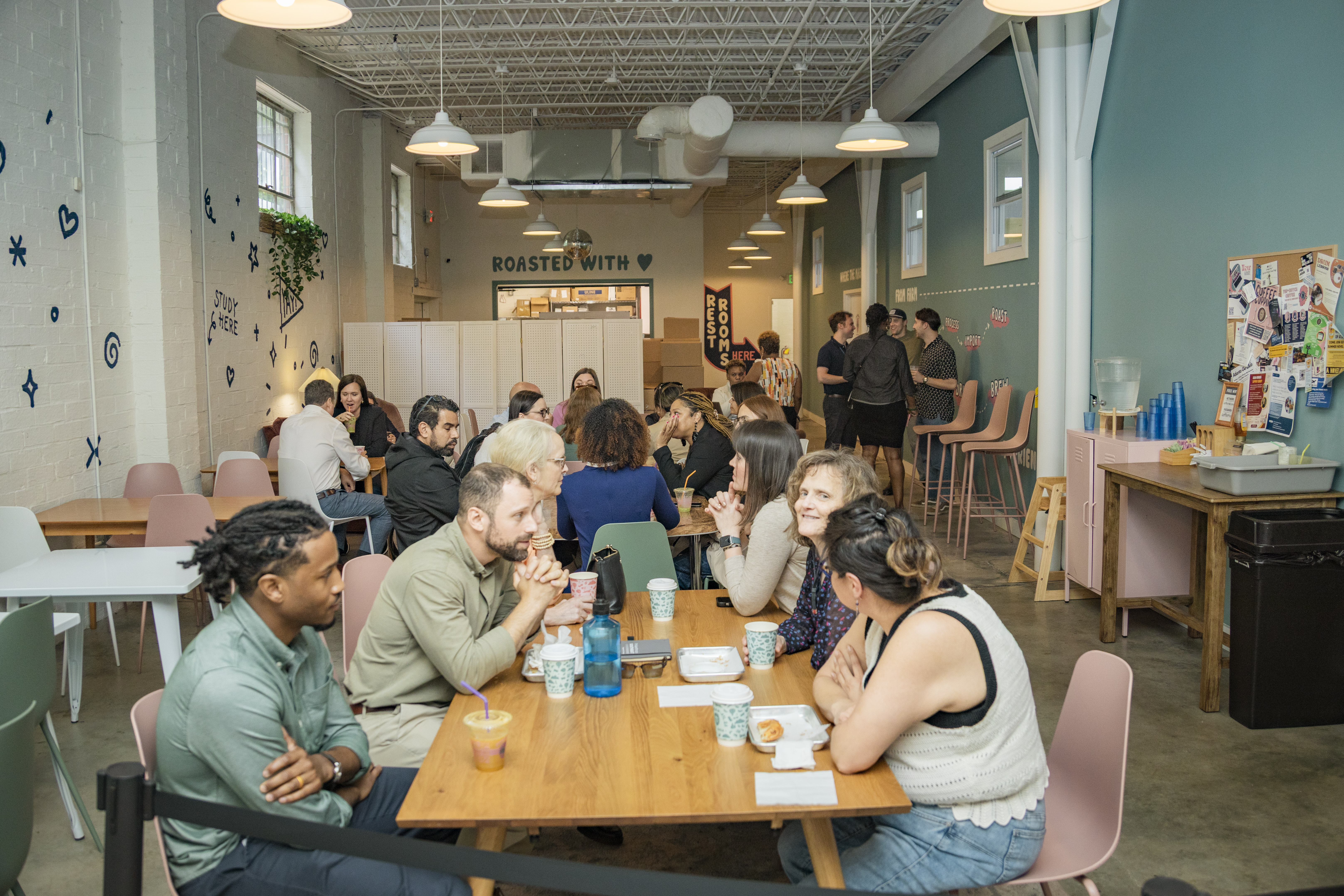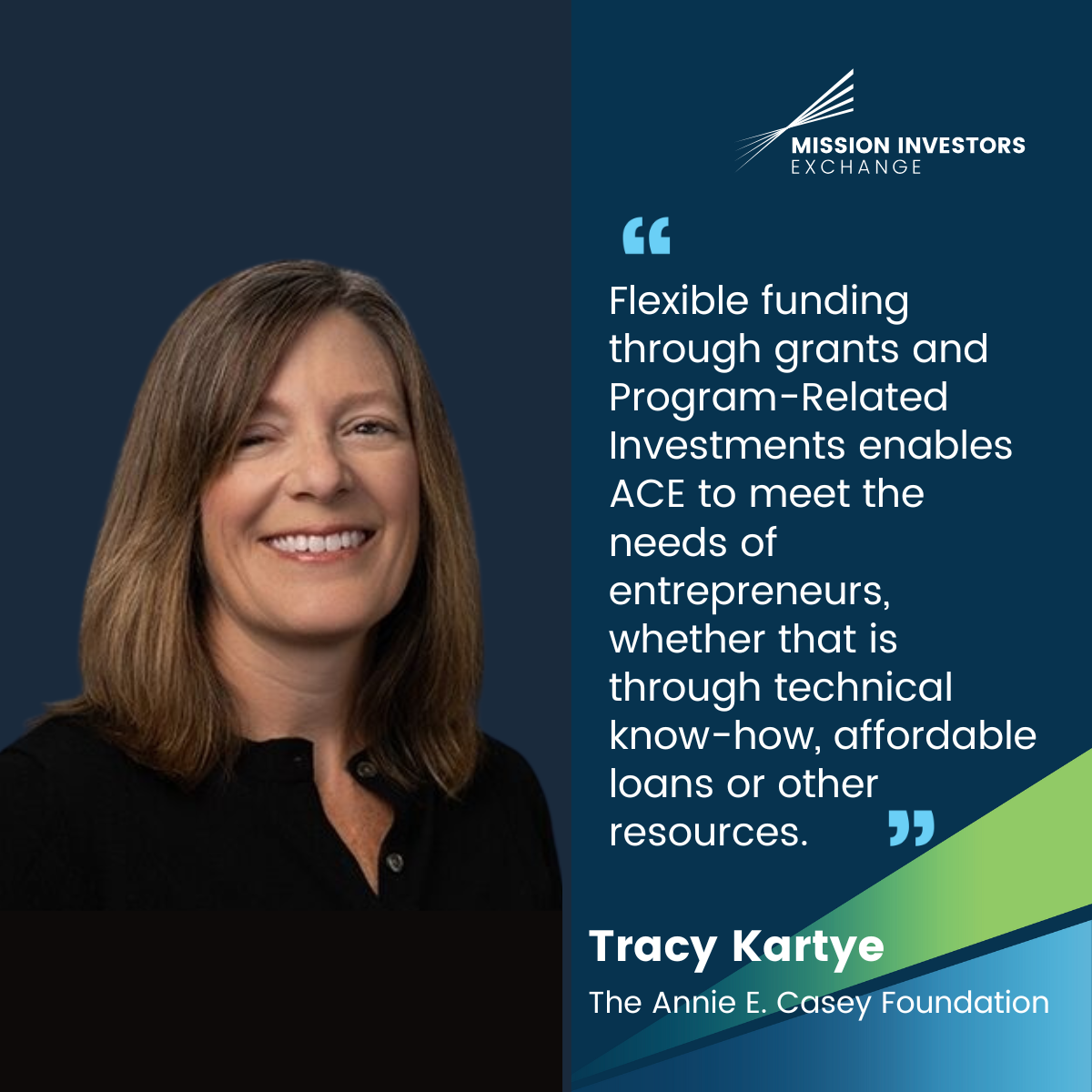Q&A: Expanding Entrepreneurship through Community Lending with Access to Capital for Entrepreneurs
Q&A with Tonya Rapley, Director of Strategic Partnerships, Access to Capital for Entrepreneurs
Mission Investors Exchange (MIE) proudly welcomed a sold-out cohort of foundation professionals to Atlanta in May for our 2025 Mission Investing Institute — an immersive training experience designed to equip those newer to the field with the tools to build mission-aligned portfolios that deliver meaningful impact.
Hosted at the Russell Innovation Center for Entrepreneurs, the Mission Investing Institute kicked off with an Impact in Action session in partnership with Access to Capital for Entrepreneurs (ACE). ACE is an Atlanta-based Community Development Financial Institutions (CDFI) that has helped North Georgia and metro Atlanta’s entrepreneurs thrive for 25 years and has been supported by several MIE members, including the Annie E. Casey Foundation. Participants heard from ACE and small business clientele in a panel discussion and then explored impact investing firsthand by visiting Coffee Man Blandtown, a small business supported by ACE.
After the Institute, Tonya Rapley, Director of Strategic Partnerships at ACE, participated in a Q&A with MIE to dive further into the work ACE is doing to expand entrepreneurship through community lending throughout Georgia.
MIE: Over the past 25 years, what are some of the most significant shifts you’ve seen in the needs of small businesses in Georgia, particularly in underserved communities?
Tonya Rapley: Over the past 25 years, ACE has witnessed transformational shifts in the needs of small businesses across Georgia, particularly in historically underserved communities.
Access to capital has remained a persistent need, but the nature of that capital has evolved. In the late 1990s and early 2000s, many entrepreneurs — especially women, BIPOC, and rural business owners — were locked out of traditional lending. Today, we’ve seen growing demand for flexible, equity-informed financing that not only meets entrepreneurs where they are but helps them scale responsibly and increases their awareness of how CDFIs can help meet their needs.
We’ve also seen a growing call for place-based investment strategies. Georgia’s communities are incredibly diverse from rural South and North Georgia to legacy Black business districts in cities like Atlanta and Augusta. Entrepreneurs need solutions tailored to their geography and lived experience. ACE has responded by expanding our presence across the state and working with local partners to deploy resources that are context-specific.
In short, the past 25 years have shown us that small business needs are more than financial; they are systemic, relational, and deeply connected to equity and long-term opportunity.
MIE: Beyond capital, what kinds of capacity-building or advisory support does ACE provide to entrepreneurs?
Rapley: From experience, we understand that access to capital alone isn’t enough, long-term business success requires comprehensive, hands-on support. There has also been a notable shift in the demand for wraparound services. Business owners no longer simply need a loan, they need coaching, credit-building tools, digital marketing support, succession planning, and systems to weather disruption.
We pair every loan with customized business advisory services, designed to meet entrepreneurs where they are in their journey. These services include one-on-one business coaching, financial statement review, marketing strategy, technology adoption, and credit counseling. Our support is often delivered in-language and through culturally competent frameworks, ensuring it resonates with the unique needs of the diverse communities we serve.
In addition, ACE offers targeted cohort programs that focus on building peer networks and strategic planning skills. We also partner with local chambers, universities, and anchor institutions to bring timely technical assistance and market access opportunities directly to our clients.
We have found that this holistic approach not only increases our borrowers’ chances of success, but it also strengthens the local economies and communities they operate in.
Mission Investors Exchange (MIE) proudly welcomed a sold-out cohort of foundation professionals to Atlanta in May for our 2025 Mission Investing Institute — an immersive training experience designed to equip those newer to the field with the tools to build mission-aligned portfolios that deliver meaningful impact.
Hosted at the Russell Innovation Center for Entrepreneurs, the Mission Investing Institute kicked off with an Impact in Action session in partnership with Access to Capital for Entrepreneurs (ACE). ACE is an Atlanta-based Community Development Financial Institutions (CDFI) that has helped North Georgia and metro Atlanta’s entrepreneurs thrive for 25 years and has been supported by several MIE members, including the Annie E. Casey Foundation. Participants heard from ACE and small business clientele in a panel discussion and then explored impact investing firsthand by visiting Coffee Man Blandtown, a small business supported by ACE.
After the Institute, Tonya Rapley, Director of Strategic Partnerships at ACE, participated in a Q&A with MIE to dive further into the work ACE is doing to expand entrepreneurship through community lending throughout Georgia.
MIE: Over the past 25 years, what are some of the most significant shifts you’ve seen in the needs of small businesses in Georgia, particularly in underserved communities?
Tonya Rapley: Over the past 25 years, ACE has witnessed transformational shifts in the needs of small businesses across Georgia, particularly in historically underserved communities.
Access to capital has remained a persistent need, but the nature of that capital has evolved. In the late 1990s and early 2000s, many entrepreneurs — especially women, BIPOC, and rural business owners — were locked out of traditional lending. Today, we’ve seen growing demand for flexible, equity-informed financing that not only meets entrepreneurs where they are but helps them scale responsibly and increases their awareness of how CDFIs can help meet their needs.
We’ve also seen a growing call for place-based investment strategies. Georgia’s communities are incredibly diverse from rural South and North Georgia to legacy Black business districts in cities like Atlanta and Augusta. Entrepreneurs need solutions tailored to their geography and lived experience. ACE has responded by expanding our presence across the state and working with local partners to deploy resources that are context-specific.
In short, the past 25 years have shown us that small business needs are more than financial; they are systemic, relational, and deeply connected to equity and long-term opportunity.
MIE: Beyond capital, what kinds of capacity-building or advisory support does ACE provide to entrepreneurs?
Rapley: From experience, we understand that access to capital alone isn’t enough, long-term business success requires comprehensive, hands-on support. There has also been a notable shift in the demand for wraparound services. Business owners no longer simply need a loan, they need coaching, credit-building tools, digital marketing support, succession planning, and systems to weather disruption.
We pair every loan with customized business advisory services, designed to meet entrepreneurs where they are in their journey. These services include one-on-one business coaching, financial statement review, marketing strategy, technology adoption, and credit counseling. Our support is often delivered in-language and through culturally competent frameworks, ensuring it resonates with the unique needs of the diverse communities we serve.
In addition, ACE offers targeted cohort programs that focus on building peer networks and strategic planning skills. We also partner with local chambers, universities, and anchor institutions to bring timely technical assistance and market access opportunities directly to our clients.
We have found that this holistic approach not only increases our borrowers’ chances of success, but it also strengthens the local economies and communities they operate in.

MIE Institute attendees on an Impact in Action site visit at Coffee Man Blandtown, an Atlanta-based small business supported by ACE.
MIE: How has MIE Sustaining Member The Annie E. Casey Foundation supported the expansion of ACE’s work across Georgia?
Rapley: The Annie E. Casey Foundation has been a critical partner in expanding ACE’s work across metro Atlanta, particularly in vulnerable and underserved communities. Their investment supported a dedicated pool of business preservation capital, providing more than $40,000 in debt payment relief to nine Black women-owned small businesses in Atlanta’s priority economic zones, helping retain 16 jobs. In tandem, the Foundation’s support funded targeted business advisory services for these and other small businesses across the Westside and Southwest Atlanta. Through this grant, ACE delivered more than 154 hours of technical assistance, including one-on-one coaching, group learning, and access to Initiate — ACE’s business education online platform.
During the COVID-19 pandemic, ACE saw an influx in need, and we helped more than 1,500 small businesses. The Annie E. Casey Foundation’s support was part of ACE’s broader COVID-19 Response and Resiliency Program, which mobilized nearly $660,000 in loan forgiveness and relief, $620,000 of which came from MIE members Community Foundation for Greater Atlanta, JP Morgan Chase & Co., Opportunity Finance Network, The Rockefeller Foundation, The Sapelo Foundation, and others. As a result, we helped retain 652 jobs, with 88% of those businesses being women-owned and 85% Black-owned. The Annie E. Casey Foundation’s investment helped ACE go beyond lending, strengthening local businesses through targeted relief, capacity building, and long-term resilience planning.
Over the years, The Annie E. Casey Foundation has grown alongside ACE, playing a vital role in attracting additional investment. Our partnership with the Foundation underscores the value of having a partner that understands the need for both lending and philanthropic capital to drive innovative solutions, provide affordable capital, and mitigate risk.
Rapley: The Annie E. Casey Foundation has been a critical partner in expanding ACE’s work across metro Atlanta, particularly in vulnerable and underserved communities. Their investment supported a dedicated pool of business preservation capital, providing more than $40,000 in debt payment relief to nine Black women-owned small businesses in Atlanta’s priority economic zones, helping retain 16 jobs. In tandem, the Foundation’s support funded targeted business advisory services for these and other small businesses across the Westside and Southwest Atlanta. Through this grant, ACE delivered more than 154 hours of technical assistance, including one-on-one coaching, group learning, and access to Initiate — ACE’s business education online platform.
During the COVID-19 pandemic, ACE saw an influx in need, and we helped more than 1,500 small businesses. The Annie E. Casey Foundation’s support was part of ACE’s broader COVID-19 Response and Resiliency Program, which mobilized nearly $660,000 in loan forgiveness and relief, $620,000 of which came from MIE members Community Foundation for Greater Atlanta, JP Morgan Chase & Co., Opportunity Finance Network, The Rockefeller Foundation, The Sapelo Foundation, and others. As a result, we helped retain 652 jobs, with 88% of those businesses being women-owned and 85% Black-owned. The Annie E. Casey Foundation’s investment helped ACE go beyond lending, strengthening local businesses through targeted relief, capacity building, and long-term resilience planning.
Over the years, The Annie E. Casey Foundation has grown alongside ACE, playing a vital role in attracting additional investment. Our partnership with the Foundation underscores the value of having a partner that understands the need for both lending and philanthropic capital to drive innovative solutions, provide affordable capital, and mitigate risk.

“Parents and young people need opportunities to earn income and build wealth. Owning a small business is one pathway to that opportunity. Casey’s partnership with ACE reflects the important resources the organization provides for Atlanta entrepreneurs,” said Tracy Kartye, Director of Social Investments at The Annie E. Casey Foundation. "Flexible funding through grants and Program-Related Investments enables ACE to meet the needs of entrepreneurs, whether that is through technical know-how, affordable loans or other resources."
MIE: How can philanthropic and private investors support the community-driven lending model that ACE exemplifies?
Rapley: Philanthropic and private investors play a critical role in sustaining and scaling the kind of community-driven lending ACE provides. Our model depends on more than just deploying capital, it requires patient, flexible, and mission-aligned investment that supports both lending and the infrastructure around it.
Program-related investments (PRIs), recoverable grants, and low-interest debt can help expand access to affordable capital for entrepreneurs who are often overlooked by traditional financial institutions. These flexible resources allow us to serve higher-risk borrowers and fund businesses that drive local job creation and generational wealth.
Grant funding is essential to support the wraparound services that make our model effective. Philanthropic dollars allow us to make our in-depth business advisory support and services possible. We are grateful for and welcome philanthropic and private partners who are committed to long-term relationship-building, not just transactions.
MIE: What do you think is needed for the CDFI industry to sustain and scale its impact in the next 5-10 years?
Rapley: To sustain and scale its impact over the next 5–10 years, the CDFI industry must prioritize three things: capitalization, capacity, and collaboration.
MIE: How can philanthropic and private investors support the community-driven lending model that ACE exemplifies?
Rapley: Philanthropic and private investors play a critical role in sustaining and scaling the kind of community-driven lending ACE provides. Our model depends on more than just deploying capital, it requires patient, flexible, and mission-aligned investment that supports both lending and the infrastructure around it.
Program-related investments (PRIs), recoverable grants, and low-interest debt can help expand access to affordable capital for entrepreneurs who are often overlooked by traditional financial institutions. These flexible resources allow us to serve higher-risk borrowers and fund businesses that drive local job creation and generational wealth.
Grant funding is essential to support the wraparound services that make our model effective. Philanthropic dollars allow us to make our in-depth business advisory support and services possible. We are grateful for and welcome philanthropic and private partners who are committed to long-term relationship-building, not just transactions.
MIE: What do you think is needed for the CDFI industry to sustain and scale its impact in the next 5-10 years?
Rapley: To sustain and scale its impact over the next 5–10 years, the CDFI industry must prioritize three things: capitalization, capacity, and collaboration.
- First, we need significantly more flexible and long-term capital to meet growing demand, especially from entrepreneurs in rural areas, communities of color, and those recovering from systemic disinvestment. That means reducing reliance on federal funds and attracting more mission-aligned investors who understand that returns in this space are both financial and social.
- Second, we must invest in the internal capacity of CDFIs themselves. As demand increases, CDFIs need the infrastructure technology systems, talent, evaluation tools, and risk management protocols to responsibly grow their portfolios while maintaining community-centered service delivery. General operating support and multi-year grants are critical to this.
- Third, collaboration will be key. CDFIs can no longer operate in silos. We must partner with one another and with government, philanthropy, financial institutions, and community organizations to design innovative capital stacks, share data, and align strategies for deeper place-based impact.
At ACE, we also believe the future of CDFIs hinges on centering equity and accountability in everything we do – from who we lend to, to how we define success. Sustaining and scaling impact means ensuring that capital flows equitably and that entrepreneurs are not only supported, but positioned to thrive and build generational wealth. In short, the next decade is not just about more lending, it’s about building a stronger, more interconnected ecosystem that advances economic justice at scale.
To learn more about how CDFIs are working in your community, check out the resources section from our Spring event on CDFIs here. To learn more about ACE, contact Tonya Rapley, Director of Strategic Partnerships.
To learn more about how CDFIs are working in your community, check out the resources section from our Spring event on CDFIs here. To learn more about ACE, contact Tonya Rapley, Director of Strategic Partnerships.




